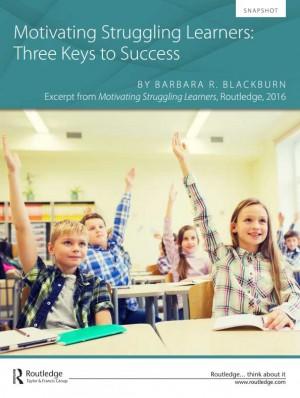Developing strong classroom management strategies is essential to create a positive learning environment for your students. From boosting student engagement in the classroom to developing study skills, learn how to manage the classroom in a way that will enhance your students' learning and lead them on a path to success.
Teachers' Hub
Student Success
Practical Teaching Tools
Video: Helping Students to Schedule Their Independent Practice
Hear from Jonathan Firth as he discusses important classroom techniques for students to learn more effectively.
Creating a 'Safe', Supportive Mathematics Classroom Environment
This resource, from one of the editors of How Values Education Can Improve Student and Teacher Wellbeing, illustrates some ways in which mathematics teachers can help students not to fear failure and to value it as an opportunity to learn and grow.
Growth Mindset Success - Criteria Examples
This downloadable criteria sheet gives you the learning criteria that you can use in your classroom. It offers key milestones that the student has passed in each stage and suggests future areas of focus.
Toolkit: Empower Your Students
In this resource pack, learn simple ways to begin incorporating passion-based learning and genius hour in your classroom.
Free Chapter: Helping Students Take Control of Their Own Learning
What does learner-centered education look like, and how can we best put it into practice? In this sample chapter, you will explore eight activities that are particularly effective early in the school year but can also be used throughout the year.
Snapshot: Motivating Struggling Learners
Motivating struggling learners is a critical skill teachers need but it’s also an area educators struggle with. This snapshot will give you three keys to success.
Free Chapter: Behaviour Management
This free chapter explores the importance of planning and subject knowledge in managing student behaviour. It describes common causes of off-task behaviour that may be attributed to appropriate learning activities, lesson structure and classroom organisation and will help you develop strategies to reduce the likelihood of such misbehaviour.
Insights From Our Education Experts
Why Does Teachers' Assessment Literacy Matter?
Assessment often does not result in improved student outcomes. Dennis Alonzo, author of Assessment to Support Learning and Teaching, explores why this is and what can be done instead to improve learning outcomes.
Small Class Sizes Not Better for Pupils’ Grades or Resilience
In a study published by the International Journal of Science Education, researchers found that minimising student numbers in classroom does not lead to better grades. In fact, the quality of the teachers is also far more important in achieving academic success.
A 5-Step Cycle to Improve Learning in Your Classroom
This short article introduces the ‘five-step learning cycle’ and how it is confirmed by what we know about how brains learn. Successful teachers, consciously or unconsciously, take their students through this cycle. Putting it into practice will improve learning outcomes for students across different age-groups and subjects.
Top Classroom Management Strategies
Discover effective classroom management strategies that can prevent behaviour problems before they occur and before they become an ongoing issue.
From Chaos to Calm: Effective Behaviour Management Strategies for the Classroom
As a teacher, there are strategies you can use to support your students' learning and behaviour. The key is to find strategies that work for you and your students, and then use them regularly to keep your classroom calm and focused.
Rigor in Your Classroom: An Exclusive Q&A with Dr. Barbara Blackburn
Read our exclusive interview with Dr. Barbara Blackburn; a leader, education expert, and author of Rigor in Your Classroom.
Visible Learning for Teachers: Maximising the Effectiveness of Your Lesson
Hear about the foundation of visible learning and teaching strategies for using it in the classroom.
How to Give Feedback to Develop Great Learners
Hear from John and Kyle Hattie, authors of 10 Steps to Develop Great Learners, as they focus on the key skill of giving and receiving feedback.
A Guide to Culturally Responsive Teaching and Resources
In this guide, delve into the principles of culturally responsive teaching. There are practical examples and resources for educators who want to deepen their understanding of this approach and improve their instruction.























